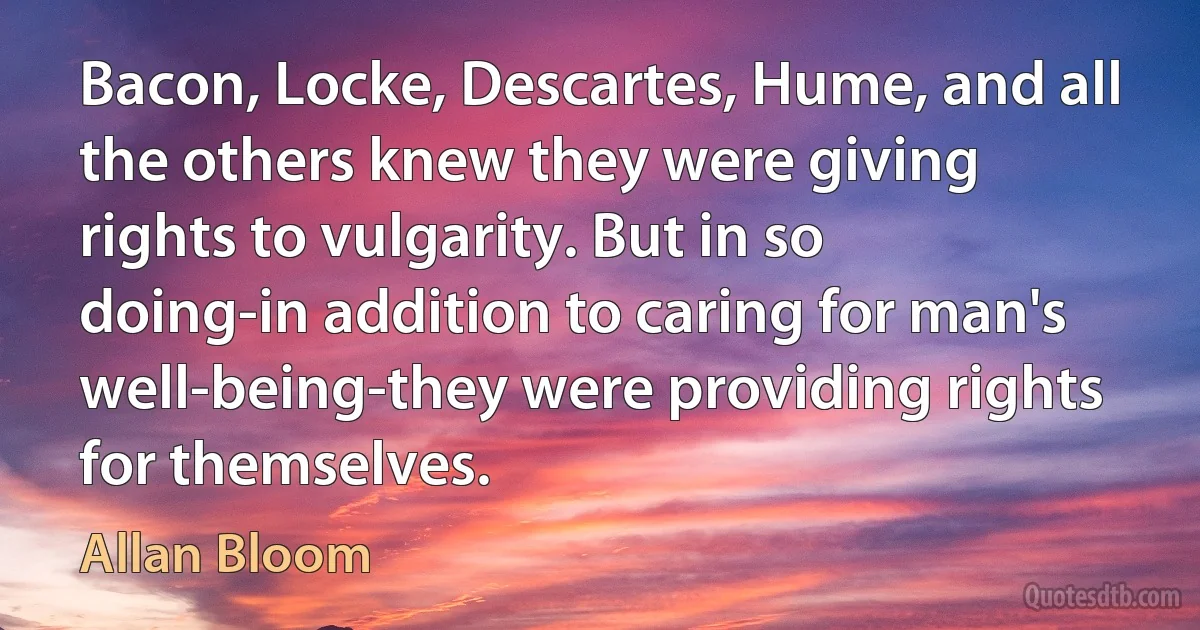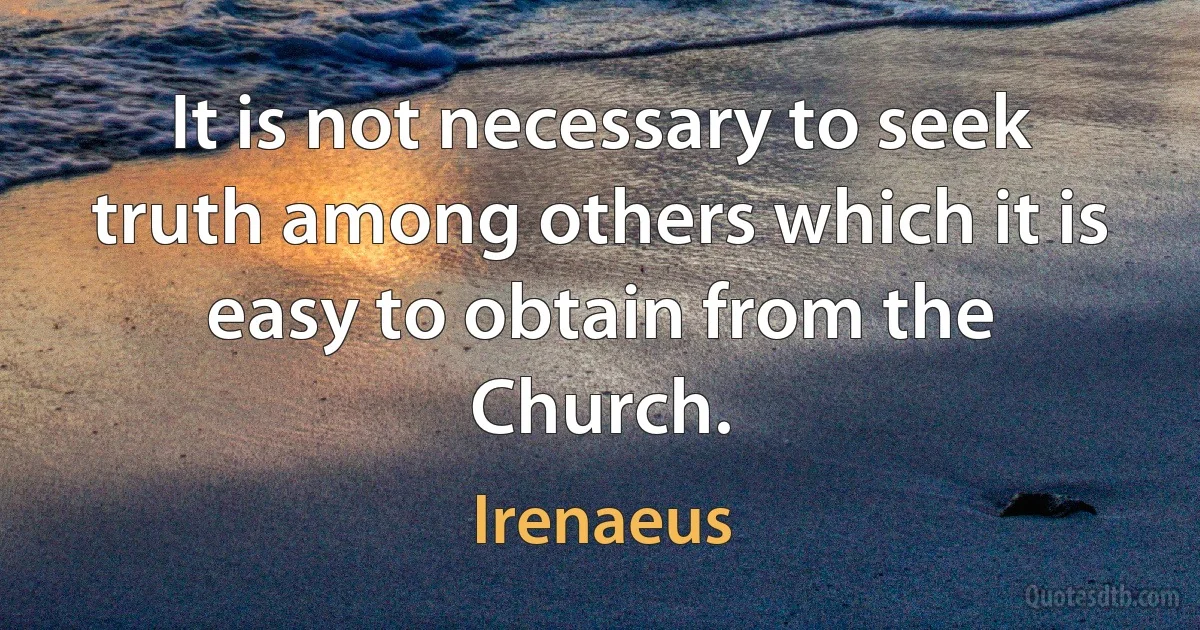Others Quotes - page 56
The United States, as the world knows, will never start a war. We do not want a war. We do not now expect a war. This generation of Americans has already had enough - more than enough - of war and hate and oppression. We shall be prepared if others wish it. We shall be alert to try to stop it. But we shall also do our part to build a world of peace where the weak are safe and the strong are just. We are not helpless before that task or hopeless of its success. Confident and unafraid, we labor on - not toward a strategy of annihilation but toward a strategy of peace.

John F. Kennedy
Every person-whether Greek or Barbarian-who is in training for wisdom, leading a blameless, irreproachable life, chooses neither to commit injustice nor return it unto others, but to avoid the company of busybodies, and hold in contempt the places where they spend their time-courts, councils, marketplaces, assemblies-in short, every kind of meeting or reunion of thoughtless people. ... People such as these, who find their joy in virtue, celebrate a festival their whole life long.

Pierre Hadot
Some of Mr. Gregory's poems have merely appeared in The New Yorker; others are New Yorker poems: the inclusive topicality, the informed and casual smartness, the flat fashionable irony, meaningless because it proceeds from a frame of reference whose amorphous superiority is the most definite thing about it-they are the trademark not simply of a magazine but of a class.

Randall Jarrell
Imagism was a reductio ad absurdum of one or two tendencies of romanticism, such a beautifully and finally absurd one that it is hard to believe it existed as anything but a logical construction; and what imagist found it possible to go on writing imagist poetry? A number of poets have stopped writing entirely; others, like recurring decimals, repeat the novelties they commeced with, each time less valuably than before. And there are surrealist poetry, and political poetry, and all the othe refuges of the indigent.

Randall Jarrell
I would remind you...that Socrates was executed not for saying what things were or should be, but for seeking practical indications of where some reasonable approximation of truth might be. He was executed not for his megalomania or grandiose propositions or certitudes, but for stubbornly doubting the absolute truths of others.

John Ralston Saul
[W]e have more than two options... a critique of reason does not have to be a call for the return of superstition and arbitrary power.... [O]ur problems do not lie with reason itself but with our obsessive treatment of reason as an absolute value. Certainly it is one of our qualities, but it functions positively only when balanced and limited by the others.

John Ralston Saul
There are two fairly standard approaches to political power used by those who seek it. Some seek power with the assumption that the citizenry are the source of legitimacy and are to be treated with respect. Others concentrate on identifying whatever insecurities there are within the citizenry and on exploiting them.

John Ralston Saul
To determine whether or not you have the ingredients to be charismatic, answer the following questions: What are your real feelings about who you are? What do you believe in? Do you have goals or a mission in life? Do you project optimism? Do others turn to you for leadership? Non-charismatic people spend their lives auditioning for others and hoping they'll be accepted. Charismatic people don't doubt their ability to add value to a situation, so they move forward with their mission.

Roger Ailes
A man who lies to himself, and believes his own lies, becomes unable to recognize truth, either in himself or in anyone else, and he ends up losing respect for himself and for others. When he has no respect for anyone, he can no longer love, and in him, he yields to his impulses, indulges in the lowest form of pleasure, and behaves in the end like an animal in satisfying his vices. And it all comes from lying - to others and to yourself.

Fyodor Dostoyevsky
What is a charitable heart? It is a heart which is burning with love for the whole creation, for men, for the birds, for the beasts ... for all creatures. He who has such a heart cannot see or call to mind a creature without his eyes being filled with tears by reason of the immense compassion which seizes his heart; a heart which is softened and can no longer bear to see or learn from others of any suffering, even the smallest pain being inflicted upon a creature. That is why such a man never ceases to pray for the animals ... [He is] ... moved by the infinite pity which reigns in the hearts of those who are becoming united with God.

Isaac the Syrian
Antony, however, according to his custom, returned alone to his own cell, increased his discipline, and sighed daily as he thought of the mansions in Heaven, having his desire fixed on them, and pondering over the shortness of man's life. And he used to eat and sleep, and go about all other bodily necessities with shame when he thought of the spiritual faculties of the soul. So often, when about to eat with any other hermits, recollecting the spiritual food, he begged to be excused, and departed far off from them, deeming it a matter for shame if he should be seen eating by others.

Athanasius of Alexandria
He that practiceth showing mercy to him that needeth, will soon cease from covetousness, he who continues in giving to the poor, will soon cease from anger, and will never even be high-minded. For as the physician continually tending wounded persons is easily sobered, beholding human nature in the calamities of others; so we, if we enter upon the work of aiding the poor, shall easily become truly wise, and shall not admire riches, nor deem present things any great matter, but despise them all, and soaring aloft to heaven, shall easily obtain the eternal blessings, through the grace and lovingkindness of our Lord Jesus Christ; to whom, with the Father and the Holy Ghost, be glory for ever and ever. Amen.

John Chrysostom
The Christianocategori, or Accusers of Christians, are such and are so called, because those Christians who worship one living and true God praised in Trinity they accused of worshiping as gods, after the manner of the Greeks, the venerable images of our Lord Jesus Christ, of our immaculate lady, the holy Mother of God, of the holy angels, and of His saints. They are furthermore called Iconoclasts, because they have shown deliberate dishonor to all these same holy and venerable images and have consigned them to be broken up and burnt.
Likewise, some of those painted on walls they have scraped off, while others they have obliterated with whitewash and black paint. They are also called Thymoleontes, or Lion-hearted, because, taking advantage of their authority, they have with great heart given strength to their heresy and with torment and torture visited vengeance upon those who approve of the images.

John of Damascus



